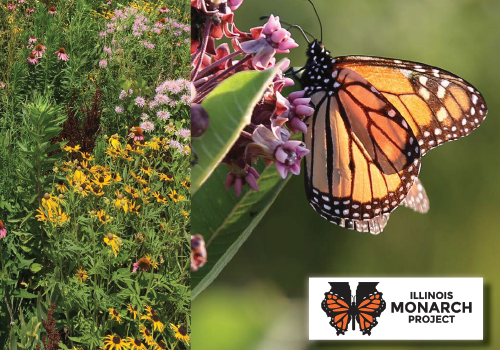The Illinois Department of Transportation recently resumed statewide roadside mowing operations, now scheduled to help maintain and grow pollinator habitat.
[Above photo by the Illinois DOT]
“We are committed to protecting the environment in the work we do every day,” noted Omer Osman, Illinois DOT’s recently confirmed secretary, in a statement.
“By combining well-defined vegetation management with mowing cycles that preserve sightlines and maximize safety, we can make a positive impact today and for future generations, [as] pollinators play a key role in the state’s ecosystem by aiding in reproduction of flowers, fruits and vegetables,” he said.
Throughout the summer, the agency noted that it conducts two primary types of mowing: Safety mowing, which occurs directly adjacent to the road as needed, and maintenance mowing, which includes areas next to culverts, ditches, traffic control devices and other structures.
The Illinois DOT noted that in recent years it revised its mowing practices to help create and maintain habitat for pollinators – including the endangered rusty patched bumblebee and the monarch butterfly – cataloged in its Illinois Monarch Project Mowing Guidelines for Pollinators.
By mowing at select times and reducing the amount of land mowed, IDOT encourages the growth of plant species such as milkweed, the only food source for monarch caterpillars.
In 2020, the Illinois DOT said it joined in the launch of the Illinois Monarch Action Plan as part of the Illinois Monarch Project, a collaborative effort to help ensure the survival and successful migration of monarchs by increasing and protecting habitat.
Alongside that effort, in March 2020, the American Association of State Highway and Transportation Officials sent a two-page letter to the U.S. Department of the Interior on March 12 supporting “expedited approval” of the voluntary national Candidate Conservation Agreement with Assurances or CCAA to further encourage the creation of pollinator habitats in highway rights-of-way. “The regulatory protections provided by this CCAA allow transportation agencies to continue vegetation management practices with less concern that these actions will lead to an increase in the costs of regulatory compliance if the monarch is listed under the Endangered Species Act,” the organization said in its letter. “We see the CCAA as advancing … guidance developed by the Federal Highway Administration on practices to support pollinator habitat.”
